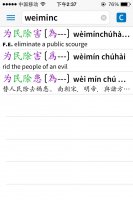Hi,
I have the Taiwan MoE custom dictionary installed, so perhaps this is an issue specific to it. I've noticed that some MoE entries are listed separately in search results, and not integrated into the result list entry that contains the definitions from the other installed dictionaries. For example the MoE entry for 工作 is included in the integrated result, but 號碼 is not. I'm just curious to know what causes this.
I have the Taiwan MoE custom dictionary installed, so perhaps this is an issue specific to it. I've noticed that some MoE entries are listed separately in search results, and not integrated into the result list entry that contains the definitions from the other installed dictionaries. For example the MoE entry for 工作 is included in the integrated result, but 號碼 is not. I'm just curious to know what causes this.

